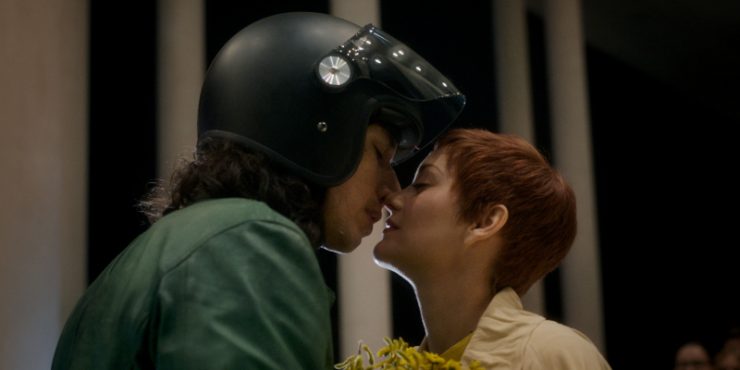Ron and Russell Mael, the two brothers that make up the band Sparks, are having a moment. Earlier this year, Edgar Wright released his documentary The Sparks Brothers, dubbing them “Your favorite band’s favorite band”. Their cult fame in the US has shown up in previous Leos Carax films, but in Carax’s latest film, Annette, the Maels have not only produced the music, but are credited as screenwriters with an “original story by” credit (Carax is the only other credited screenwriter). As a musical, Annette has its moments. It succeeds in larger-than-life drama, and allows its actors to test the limits of their own vocal range – sometimes to its own peril. The songs are cheeky but Annette‘s charisma is held precariously in the hands of its stars – Adam Driver and Marion Cotillard – and only one of those two is up to the task.
Driver has spent the last decade rising steadily in fame and reputation. He’s gone from the angry boyfriend of Girls to the angsty Darth Vader Jr. of the most recent Star Wars trilogy, crescendoing in an Oscar-nominated performance in Marriage Story. Marriage Story was perfect because it played so well against Driver’s barrel chested sex appeal. Flipping his square peg/round hole conundrum by making him the roundest (ass)hole there ever was. It was refreshing to see him in the role of a sensitive but self-important playwright. Most of his films take the easy route: contrasting his blunt physicality with his emotional pliability. Annette plays the hits, in this regard, taking advantage of Driver’s impressive physique and unorthodox handsomeness, to craft the character of Henry McHenry, a caustic stand up comedian.
The name Henry McHenry is one of many things in Annette that attempts something between an easy laugh and conceptual symbolism, while failing on both. Carax and the Maels seem to enjoy that the audience will never truly know if this film is trying to be sincere or a giant joke. The same goes for McHenry’s standup act, which is a hostile, sing-song call-and-response between him and his audience, where his provocative “jokes” drip with disdain (his show is called “The Ape of God”). His badboy image brings him great fame and also catches the eye of opera soprano Ann Defrasnoux (Cotillard). Henry and Ann’s love is pure passion, overcoming the incessant media attention. They live in a woodsy hideaway far from the bright lights of Los Angeles where they work. They perform song numbers while they make love, and soon get married.
Things turn sour when they have a baby, a young girl named Annette (played for a grand majority of the film by a wooden puppet, though near the end with surprising gravity by Devyn McDowell). Henry quickly becomes suffocated by the pressures of fatherhood and marriage. His act suffers and his popularity wanes, while Ann’s star continues to rise. Henry’s behavior becomes more alienating, worrying Ann. Even Ann’s piano accompanist (Simon Helberg), a forlorn former lover, begins to worry. Caught in the middle is Annette, whose own gift for singing becomes apparent even in her young age. The lovers become caught in a tempest – both figuratively and literally – that threatens to ruin their marriage forever.
Perhaps the biggest obstacle for Annette is Driver, who is the film’s biggest presence by a large margin, and the actor least comfortable with the material. Cotillard, a movie star with underrated versatility, fits seamlessly into Carax’s taste for absurdity and melodrama. She balances the role’s eye-candy radiance with honest vulnerability in a way that can sometimes make sense of the nonsense she’s playing. **SPOILER ALERT** It is quite disappointing when Cotillard’s Ann is removed about halfway through the movie, only showing up thereafter as a spirit in the background of Henry’s conscience. It was at that moment, with over an hour left in the film, that I began to truly fret. You can never deny Driver’s willingness to “go for it”, but Annette really stretches the limits of his commitment-oriented style. He gets louder when he can’t find the authenticity.
This is Carax’s first film since Holy Motors in 2012. That film was a more unleaded version of his more usual brand of anarchy. It starred Denis Levant, an actor much more suited to his style and in line with his sense of humor. Like Annette, Holy Motors shifts between satire and nihilism, but Motors really has a better feel for its own conceits. Both films have a multitude of visual non sequiturs, but Annette misses wildly in spirit and execution. Even the Sparks songs, diegetic talk-singing a la Jacques Demy, are mostly flat, difficult to justify outside of stylistic layering (and they hold a lot of responsibility for the film’s bloated 139 minute runtime). Like Henry McHenry’s “Ape of God”, there seems to be the assumption that a lot of it is supposed to be funny, but I never found myself laughing. So it’s either an unfunny comedy or a musical without any catchy songs. ‘Much ado about nothing’ hardly begins to describe it.
Directed by Leos Carax










